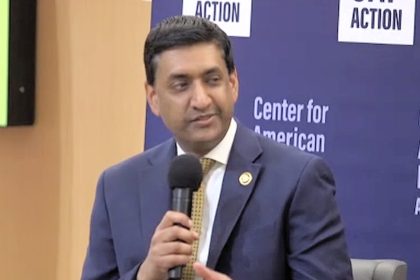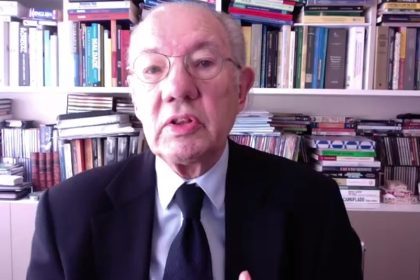Cato Institute Forum Examines Implications of Space Force’s Formation

In a virtually-hosted policy analysis presented by the Cato Institute, a panel of experts explored whether the creation of the United States Space Force was ahead of its time.
The Dec. 8 panel featured University of Kentucky senior lecturer Robert Farley, Deputy Director and Fellow of the Center for Strategic and International Studies’ Aerospace Security Project Kaitlyn Johnson, and Secure World Foundation Director of Program Planning Brian Weeden. The panel’s debate was moderated by Eric Gomez, the Cato Institute’s Director of Defense Policy Studies.
Initially created as the Air Force Space Command in 1982, the Space Force became an independent military branch in Dec. 2019 when President Donald Trump signed 2020’s National Defense Authorization Act. The NDAA for 2020 included the “United States Space Force Act,” which established the first new armed service branch since 1947, according to the U.S. Department of Defense.
“Creating a new military organization is essentially a bureaucratic reform,” Farley said during the event. “It is a different way of structuring our uniforms, our paperwork and our bureaucracy so that we approach the use of military force in a different way.”
Although the utilization of space for military purposes has been common since the 1940s, it is also increasingly the “backbone” of the civilian economy, Farley said. Satellite technology enables instant connectivity and communication that leads to diversification of supply chains.
In broad terms, the USSF’s duties encompass joint operations and support for other military branches, independent space operations and management of “space commons,” Farley said. Although the vacuum of space is rarely thought of as a “common area” for humankind, new innovations could alter that mindset.
Farley noted the benefits of the force’s independence include the ability for other military branches to better manage their priorities by delegating responsibility to it, incentivizing development of human capital around space expertise and the development of strategic space theory, among others.
However, Farley said the drawbacks of the force’s establishment include exploitation of space as a domain, administrative incongruencies with international space organizations that could hinder cooperation, and the bureaucratizing of space.
Additionally, the force’s long-term impact on the national defense budget remains unclear at this time, he said.
“We know how large it’s going to be in five years, probably, but we don’t have a sense of how large it’s going to be in fifteen or twenty years,” Farley said. “We don’t have a sense of what its basing is going to look like, what its personnel overhead is going to look like, how big it’s going to be. All of these are questions that one would often expect to answer prior to the creation of a new service rather than sometime after.”
There is a significant disconnect between how the U.S. Air Force was established and how the USSF has been established, he said. The Air Force had already established a robust set of theories and doctrines outlining how warfare was to be conducted by air prior to its formation in 1947, whereas the Space Force lacks similarly defined principles.
Although the force’s institution was partially about resolving bureaucratic issues, Farley said the full implications of an independent Space Force have yet to be worked out.
“This should be really encouraging to both the established defense industry, but really the burgeoning new space market and the space economy that we’re hoping to see maybe in the next few decades,” Johnson said during the event.
Protecting the assets of the American space industry will be a priority of the force, Johnson said. With this in mind, the condensed timeframe of the force’s establishment makes economic sense.
Commercial growth is a substantial factor to consider when questioning the force’s scope, she said. The trends compelling these institutional changes are mostly driven by commerce, not the military.
Engagement with foreign powers in space remains a looming question for USSF, Weeden said during the event. Without an agreed-upon set of rules for all countries with space capabilities, possibilities for conflict abound.
Agreements and treaties needed hashing out once large-scale maritime and airborne military activity became prevalent, he said. Space as a domain, particularly in regards to both military and commercial satellite technology, should not be left unregulated.
“If you’re going to create a space governance framework or norms of behavior, that needs significant space actors that are buying into those frameworks,” Weeden said during the event. “They might go off and create their own competing norms or competing governance frameworks, that just isn’t a great environment for anyone. I do think this is one of the big questions we have to tackle — is ‘How do we find a way to engage with Russia and China?’”
























